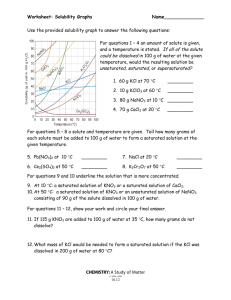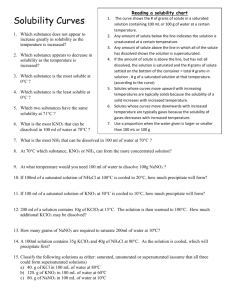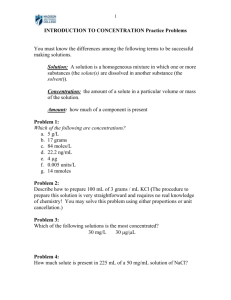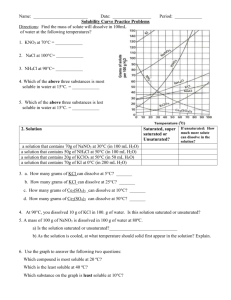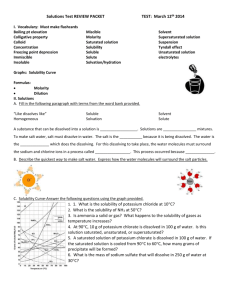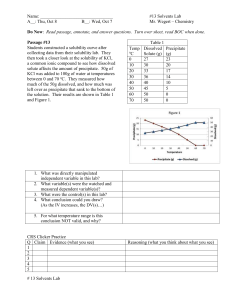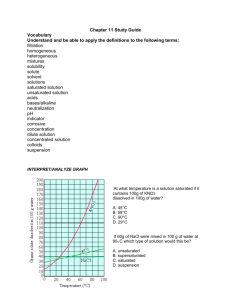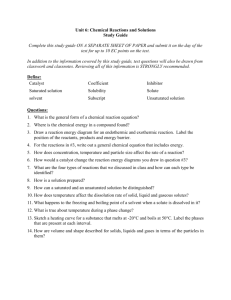Interpreting Solubility Curves Name
advertisement
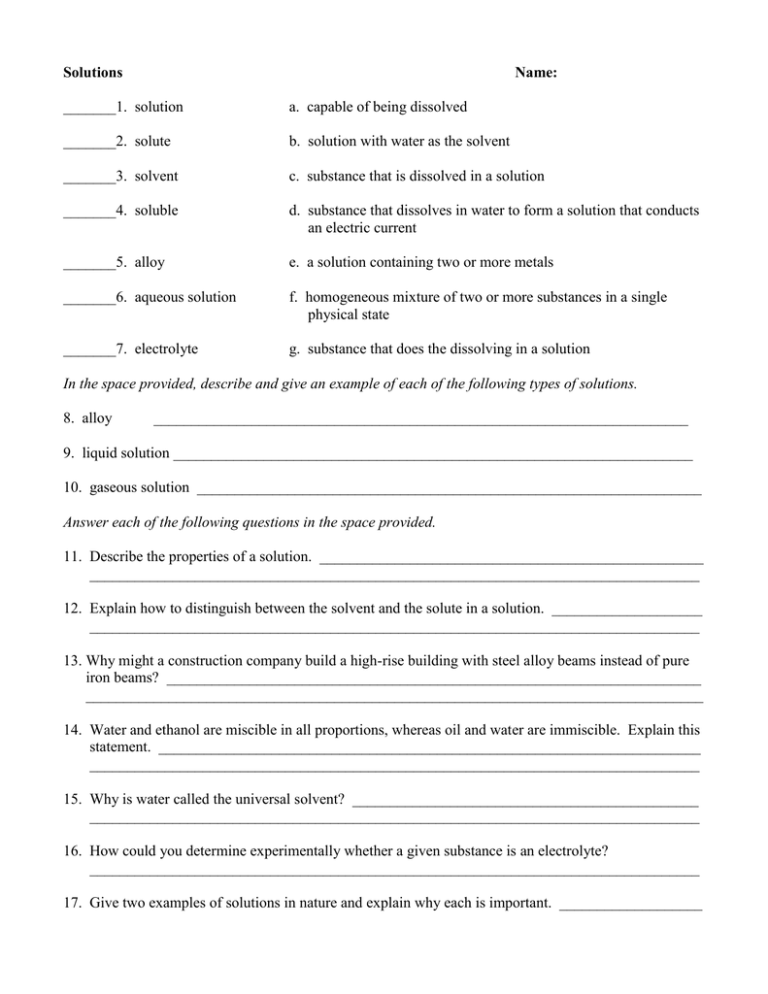
Solutions Name: _______1. solution a. capable of being dissolved _______2. solute b. solution with water as the solvent _______3. solvent c. substance that is dissolved in a solution _______4. soluble d. substance that dissolves in water to form a solution that conducts an electric current _______5. alloy e. a solution containing two or more metals _______6. aqueous solution f. homogeneous mixture of two or more substances in a single physical state _______7. electrolyte g. substance that does the dissolving in a solution In the space provided, describe and give an example of each of the following types of solutions. 8. alloy _______________________________________________________________________ 9. liquid solution _____________________________________________________________________ 10. gaseous solution ___________________________________________________________________ Answer each of the following questions in the space provided. 11. Describe the properties of a solution. ___________________________________________________ _________________________________________________________________________________ 12. Explain how to distinguish between the solvent and the solute in a solution. ____________________ _________________________________________________________________________________ 13. Why might a construction company build a high-rise building with steel alloy beams instead of pure iron beams? _______________________________________________________________________ __________________________________________________________________________________ 14. Water and ethanol are miscible in all proportions, whereas oil and water are immiscible. Explain this statement. ________________________________________________________________________ _________________________________________________________________________________ 15. Why is water called the universal solvent? ______________________________________________ _________________________________________________________________________________ 16. How could you determine experimentally whether a given substance is an electrolyte? _________________________________________________________________________________ 17. Give two examples of solutions in nature and explain why each is important. ___________________ _________________________________________________________________________________ 18. Type of Solution Gas in Gas Gas in Liquid Gas in Solid Liquid in Gas Liquid in Liquid Liquid in Solid Solid in Gas Solid in Liquid Solid in Solid Specific Solute Specific Solvent Interpreting Solubility Curves Name ______________________________ Date ________________ Period _________ Using the solubility graph, answer the following questions. 19. Which substance does not appear to increase greatly in solubility as the temperature is increased? ____________ 20. Which substance(s) appears to decrease in solubility as the temperature is increased? __________________________________________________________________ 21. Which substance appears to increase most in solubility as the temperature is increased? ______________ 22. Which substance is most soluble at 0C? ___________________________________ 23. Which substance is least soluble at 0C? ___________________________________ 24. Which two substances have the same solubility at 73C? _______________________ 25. What is the most KNO3 that can be dissolved at 70C? ________________________ 26. What is the most NH4Cl that can be dissolved at 70C?________________________ 27. At 70C which substance, KNO3 or NH4Cl, can form the more concentrated solution? _______________ 28. At what temperature would you need 100 g of water to dissolve 70 g of NH4Cl? __________ 29. At what temperature would you need 100 g of water to dissolve 70 g of KNO3? __________ Solubility Worksheet 30. What is the solubility of KNO3 at 30C? ____________________________________ 31. What is the solubility at KNO3 at 70C? ____________________________________ 32. Which compound varies the least in solubility over the temperature range of the graph? _________________ 33. In general, what can you say about the solubility of most solids in relationship to temperature? ___________________________________________________________________________ 34. Which compounds do not appear to follow this trend? _______________________________ 35. What change occurs in the solubility of NH3 as the temperature of the solution increases from 20C to 100C? _____________________________________________________________ 36. What is the difference between the solubilities of KNO3 and NaCl at 24C? ______________ 37. What is the difference between the solubilities of KNO3 and NaCl at 73C? ______________ 38. What type of solution will be formed if 120 grams of KI dissolved in 100 ml of water at 10C? __________________________________ 39. What type of solution will be formed if 120 grams of NaNO3 dissolve in 100 ml of water at 40C? ________________________________ 40. How many grams of NaCl are needed to make a saturated solution at 100C? ________________ 41. A saturated solution of KCl is made at 70C. 100 ml of solution is cooled to 50C and stirred. How many grams of KCl solid will appear on the bottom of the beaker? ______________ 42. At 100C, the least soluble compound is ______________________. 43. At OC, the most soluble compound is ______________________. The Nature of Solutions _______44. solution a. capable of being dissolved _______45. solute b. solution with water as the solvent _______46. solvent c. substance that is dissolved in a solution _______47. soluble d. substance that dissolves in water to form a solution that conducts an electric current _______48. alloy e. a solution containing two or more metals _______49. aqueous solution f. homogeneous mixture of two or more substances in a single physical state _______50. electrolyte g. substance that does the dissolving in a solution In the space provided, describe and give an example of each of the following types of solutions. 51. alloy _______________________________________________________________________ 52. liquid solution _____________________________________________________________________ 53. gaseous solution ___________________________________________________________________ Answer each of the following questions in the space provided. 54. Describe the properties of a solution. ___________________________________________________ _________________________________________________________________________________ 55. Explain how to distinguish between the solvent and the solute in a solution. ____________________ _________________________________________________________________________________ 56. Why might a construction company build a high-rise building with steel alloy beams instead of pure iron beams? _______________________________________________________________________ __________________________________________________________________________________ 57. Water and ethanol are miscible in all proportions, whereas oil and water are immiscible. Explain this statement. ________________________________________________________________________ _________________________________________________________________________________ 58. Why is water called the universal solvent? ______________________________________________ _________________________________________________________________________________ 59. How could you determine experimentally whether a given substance is an electrolyte? ________________________________________________________________________________ 60. Give two examples of solutions in nature and explain why each is important. ___________________ _________________________________________________________________________________ Solutions Practice Circle One: 61. Which state’s streams will trout survive in better? Georgia Maine 62. Which will the fizz remain better in soda? in the refrigerator at the beach 63. Which will dissolve more sugar in your drink? ice tea hot tea 64. Does CO2 dissolve more in soda under high pressure low pressure neither 65. Does sugar dissolve more in soda under high pressure low pressure neither Beaker #1 Beaker #2 Iodine & Water Salt & Water Beaker #3 Beaker #4 Salt & CCl4 Iodine & CCl4 66. List the solute: ____________ _______________ _______________ _______________ 67. List the solvent: ___________ _______________ _______________ _______________ 68. Look at the beakers above, label solutes as either ionic or molecular: ______________ _______________ _______________ _______________ 69. Look at the beakers above, label solvents as either polar or nonpolar: ______________ _______________ _______________ _______________ 70. Label which solutions will be soluble or insoluble: ______________ _______________ _______________ _______________ 71. Which salt is least soluble in water at 20◦C? ________________ 72. How many grams of potassium chloride, KCl, can be dissolved in 200 g of H2O at 80◦C? __________ 73. At 40◦C, how much potassium nitrate, KNO3, can be dissolved in 300 g of H2O? ___________ 74. Which salt shows the least change in solubility from O◦C to 100◦C? __________ 75. At 30◦C, if 90 g of sodium nitrate, NaNO3, is dissolved in 100 g of H2O is this solution saturated, unsaturated or supersaturated? ________________________ 76. A saturated solution of potassium chlorate is formed in 100 g of H2O. If the saturated solution is cooled from 80◦C to 50◦C, how many grams of precipitate are formed? _____________ 77. What compound shows a decrease in solubility from 0◦C to 100◦C? ________ why? ______________ 78. Which salt is most soluble at 10◦C? ____________ 79. Which salt is least soluble at 50◦C? ____________ 80. Which salt is least soluble at 90◦C? ____________ Molarity Problems Concentration of Solutions: Complete each of the following sentences by filling in the appropriate word or phrase. Then solve each of the following problems as directed. Show all your work. 81. ___________________is the concentration of a solution expressed as the number of moles of solute dissolved in each liter of solution. 82. A ______________________ solution contains as much solute as can be possibly dissolved under existing conditions of temperature and pressure. 83. The amount of solute in a given amount of solvent or solution is the ____________________ of a solution. 84. A solution that contains more solute particles than are needed to form a saturated solution is _________________________. 85. A solution that has less than the maximum amount of solute that can be dissolved is called a(n) ___________________________ solution. 86. What is the molarity of the solution formed by mixing 0.20 mol of sodium hydroxide with enough water to make 150. ml of solution? 87. How many grams of potassium bromide should be added to water to prepare 0.50 L of solution with a molarity of 0.125 M? 88. What is the molarity of the solution produced when 145 g of sodium chloride is dissolved in sufficient water to prepare 2.75 L of solution? 89. How many grams of potassium chloride are needed to prepare 0.750 L of a 1.50 M solution of potassium chloride in water? 90. What is the molarity of the solution produced when 85.6 g of hydrochloric acid is dissolved in sufficient water to prepare 0.385 L of solution? 91. To produce 3.00 L of a 1.90 M solution of sodium hydroxide, how many grams of sodium hydroxide must be dissolved? 92. If 8.77 g of potassium iodide are dissolved in sufficient water to make 4.75 L of solution, what is the molarity of the solution? 93. In order to prepare 2.00 L of a 3.00 M solution of iron (III) chloride, how many grams of iron (III) chloride must be used? 94. What is the molarity of the solution produced when 14.1 g of ammonia (NH3) is dissolved in sufficient water to prepare 0.100 L of solution? 95. Copper (II) sulfate, an important copper salt, is used in copper electroplating cells and to kill algae in swimming pools and water reservoirs. What is the molar concentration of an electroplating solution in which 1.50 mol of copper (II) sulfate are dissolved in water to make 2.00 L of solution? 96. Sodium bicarbonate is used medicinally to counteract excess stomach acidity. How many moles of solid sodium bicarbonate would be needed to make 100. mL of 0.660 mol/L solution suitable for use as an antacid? 97. What is the molar concentration of a solution in which 0.240 mol of washing soda, Na2CO3 10H2O, is dissolved in water to make 480. mL of a solution for softening wash water? 98. A useful tile and household cleaner is (tri)sodium phosphate – (TSP). Find the number of moles of Na3PO4 in 2.00 L of a 0.100 mol/L Na3PO4(aq) cleaning solution prepared for use at home. 99. A given sample of household ammonia contains 156 g of NH3(g) dissolved in water to form 2.00 L of solution. What is the molar concentration of the household ammonia solution? 100. A rust stain remover may be prepared by dissolving potassium persulfate (K2SO5) in water. How many moles of potassium persulfate are there in 500. mL of a 0.242 mol/L solution suitable for removing dust stains? 101. What is the molar concentration of 500. mL of a solution that contains 12.7 g of swimming pool chlorinator, Ca(OCl)2? 102. A car battery terminal protective coating can be prepared by dissolving 240.0 g of sodium silicate, (Na2SiO3), in water to make 250. mL of solution. What is the molar concentration of the solution? 103. Since a saturated solution of calcium chloride does not freeze until –55 ºC, calcium chloride can be used to melt ice on roads and walks. What is the molar concentration of a saturated solution in which 3.944 kg of calcium chloride is dissolved in water to make 5.00 L of solution? 104. Sodium phosphate may be used to remove scale deposits from a car radiator. What volume of a 0.075 mol/L solution would contain the necessary 1.10 mol of sodium phosphate to remove the radiator scales? 105. Sodium thiosulfate pentahydrate, known as hypo, is used as a fixer in photography because it readily dissolves silver compounds. Describe how to prepare 100. mL of a 0.120 mol/L hypo solution. 106. A solution of sodium phosphate makes a very efficient cleaner for old brushes hardened with paint. What volume of 0.700 mol/L brush cleaning solution can be prepared from the 126 g sodium phosphate? 107. Ammonium carbonate is a suitable substitute replacement for the aqueous solution of ammonia as a household cleaning agent because it yields ammonia readily. Describe how to prepare 500. mL of a 0.450 mol/L solution of ammonium carbonate. Solutions & Solubility Curves Part A: Choose words from the word list to fill in the blanks in the following paragraphs relating to solutions and the dissolving process. The list groups words with contrasting or related meanings. WORD LIST: atoms / ions / molecules grams small / large dissolve(s) homogeneous /heterogeneous solute / solvent filter phase solid / liquid / gas filtration scatters solution / suspension 108. A solution is a _________________________________ mixture of two or more substances. The composition of this mixture can vary within certain limits. In the case of a solution of table salt and water, careful experiments show that a maximum of 35.7g of sodium chloride can be dissolved in 100g of water at 0oC. Thus, the concentrations of aqueous solutions of sodium chloride can vary in any amount up to 35.7 _______________ of sodium chloride per 100 ________________ of water. A solution is composed of a solvent and at least one ______________________. One substance is uniformly dispersed, or spread, throughout the other. In an ordinary solution, the substance present in the greatest amount is called the ____________________________. The other substance, called the ______________________, is uniformly dispersed throughout the solvent. The ___________________ is described as the dissolving medium; that is, the action of the _____________________________ has caused the particles of the solute to become uniformly dispersed throughout the mixture. In many cases, one of the components changes ______________________ as the solution is formed. The substance that changes phase is called the ________________________ while the substance that does not change phase is the _________________________. The ________________________ is considered to have dissolved the ______________________. Water is a common solvent for many substances representing all three phases. Many common solids such as table salt and sugar, dissolve in water to form solutions in the _______________ phase. Liquids such as ethyl alcohol and glycerine _______________________ in water. Ammonia is one ______________ that is very soluble in water. Other gases such as oxygen and carbon dioxide _________________________ in water to a much lesser extent. The particles of solute within a solution are very ____________________ in size. Most of these particles are molecules, _____________________, or ______________________. Since the particle size is so small, solutions cannot be separated into solute and solvent by _________________________. Solute particles are too small to be trapped by the fibers of the _______________________. A sample of a true ___________________________ is clear and transparent. It may have a color. The ______________________ size of the solute particles permits a beam of light to pass through a solution unchanged. Some mixtures that appear to be solutions, but are actually __________________________, because they contain particles too ____________________ to be true solutes. These particles, which are larger than molecules, ____________________ or ___________________, partially block and scatter a beam of light (the Tyndall Effect.) Part B: Define the following words in reference to solutions: solubility:___________________________________________________________________ saturated:___________________________________________________________________ unsaturated:_________________________________________________________________ supersaturated:_______________________________________________________________ Part C: Describe what would happen if a single crystal of solute were dropped into each of the three types of solutions. The results of the addition of a single crystal to a solution is the test for the type of solution. saturated:________________________________________________________________ unsaturated:______________________________________________________________ supersaturated:___________________________________________________________ Part D: Use your solubility curve to answer the following questions: 109. What is the solubility of NaNO3 at 20oC? ________________________________________ 110. What is the solubility of NaNO3 at 40oC? ________________________________________ 111. What type of solution will be formed if 120.g of KI dissolve in 100.g of water at 40oC? _________________________ 112. What type of solution will be formed if 80.g of NH4Cl dissolve in 100.g of water at 70.oC?__________________________ 113. How many grams of KCl are needed to make a saturated solution at 100oC? ______________ 114. A saturated solution of KNO3 is made at 70oC. 100. grams of solution is cooled to 50oC and stirred. How many grams of solid KNO3 will appear on the bottom of the beaker? _________ 115. At 100.oC, the least soluble solid compound is ___________________. 116. At 0oC, the most soluble solid compound is _____________________. 117. NH3, HCl and SO2 are gases. As temperature increases, what happens to their solubilities? ___________________________ 118. Over the temperature range shown, the least soluble gas is ____________________ 119. The gas which shows the greatest change over the temperature range is _________________ 120. To make a saturated solution of NH4Cl at 60.oC, you would add ___________grams to 100.g of H2O. 121. To make an unsaturated solution of KClO3 at 40.oC, you can add no more than __________g of KClO3 to 100.g of H2O. 122. 100.g of a saturated solution of NH3(g) in H2O was heated from 20.oC to 50.oC. How many grams of NH3 gas could be collected? _____________________
